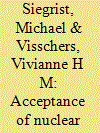|
|
|
Sort Order |
|
|
|
Items / Page
|
|
|
|
|
|
|
| Srl | Item |
| 1 |
ID:
125398


|
|
|
|
|
| Publication |
2013.
|
| Summary/Abstract |
Utilizing a longitudinal study design, the impact of the 2011 accident in Fukushima on acceptance of nuclear power and the evaluation of several scenarios with different percentages of nuclear power were examined. Mail surveys were conducted in the German-speaking part of Switzerland. The first survey took place before the accident in Fukushima (Autumn 2010), the second survey immediately after the accident (March 2011), and the third survey half a year after the accident (October 2011). A sample of 463 persons participated in all three surveys. The accident had a negative impact on the acceptance of nuclear power. The mean change was moderate, and high correlations between the measurement points were observed. Overall, participants thus showed rather stable attitudes towards nuclear power across the three measurement waves. Results of the present study demonstrate the importance of prior beliefs and attitudes for the interpretation of an accident. The evaluation of the various scenarios was strongly influenced by participants' pre-Fukushima attitudes towards nuclear power.
|
|
|
|
|
|
|
|
|
|
|
|
|
|
|
|
| 2 |
ID:
112910


|
|
|
|
|
| Publication |
2012.
|
| Summary/Abstract |
To raise public acceptance of new energy policies, promoting the fairness of the outcomes and of the decision-making procedure has been suggested. Very few studies have examined the role of fairness in public acceptance of rebuilding nuclear power plants. Therefore, using a large mail survey, we investigated the public's acceptance of the decision to rebuild nuclear power plants in Switzerland by 2020. The study examined the influence of procedural fairness and outcome fairness on the acceptance of this decision, as well as other factors such as risk perception and benefit perception. Additionally, we investigated the moderating influence of general attitudes towards nuclear power on the relation between fairness and decision acceptance. Results indicated that outcome fairness strongly increased decision acceptance, along with general attitudes towards nuclear power and perceived economic benefits. Procedural fairness had only a small impact on decision acceptance. The influence of fairness on decision acceptance did not seem to depend on general nuclear attitudes. Our findings imply that, in the case of rebuilding nuclear power plants, perceived benefits and outcome fairness are important determinants of acceptance of the decision, while procedural fairness only has a limited impact.
|
|
|
|
|
|
|
|
|
|
|
|
|
|
|
|
| 3 |
ID:
110753


|
|
|
|
|
| Publication |
2011.
|
| Summary/Abstract |
The present paper aims to identify and describe different types of energy consumers in a more comprehensive way than previous segmentation studies using cluster analysis. Energy consumers were segmented based on their energy-related behavioral characteristics. In addition to purchase- and curtailment-related energy-saving behavior, consumer classification was also based on acceptance of policy measures and energy-related psychosocial factors, so the used behavioral segmentation base was more comprehensive compared to other studies. Furthermore, differentiation between the energy-saving purchase of daily products, such as food, and of energy efficient appliances allowed a more differentiated characterization of the energy consumer segments. The cluster analysis revealed six energy consumer segments: the idealistic, the selfless inconsequent, the thrifty, the materialistic, the convenience-oriented indifferent, and the problem-aware well-being-oriented energy consumer. Findings emphasize that using a broader and more distinct behavioral base is crucial for an adequate and differentiated description of energy consumer types. The paper concludes by highlighting the most promising energy consumer segments and discussing possible segment-specific marketing and policy strategies.
|
|
|
|
|
|
|
|
|
|
|
|
|
|
|
|
| 4 |
ID:
132670


|
|
|
|
|
| Publication |
2014.
|
| Summary/Abstract |
The nuclear accident in Fukushima and the subsequent discussions about nuclear power influenced public acceptance of this technology. The aim of the present study was to examine why after the Fukushima accident some people converted from supporting nuclear power to opposing it or became undecided. Data from a longitudinal telephone survey with two measurement points were used. The first survey was conducted about 15 months before the accident in Fukushima and the second survey was conducted about 20 months after. The sample consisted of 561 respondents from the German- and French-speaking regions of Switzerland. Results suggest that changes in benefits perception were mainly responsible for people×s changes in attitude toward nuclear power. People perceived somewhat more risks related to nuclear power after the accident in Fukushima. This change in risk perception did not explain the attitudinal changes of proponents into opponents of nuclear power, however.
|
|
|
|
|
|
|
|
|
|
|
|
|
|
|
|
|
|
|
|
|